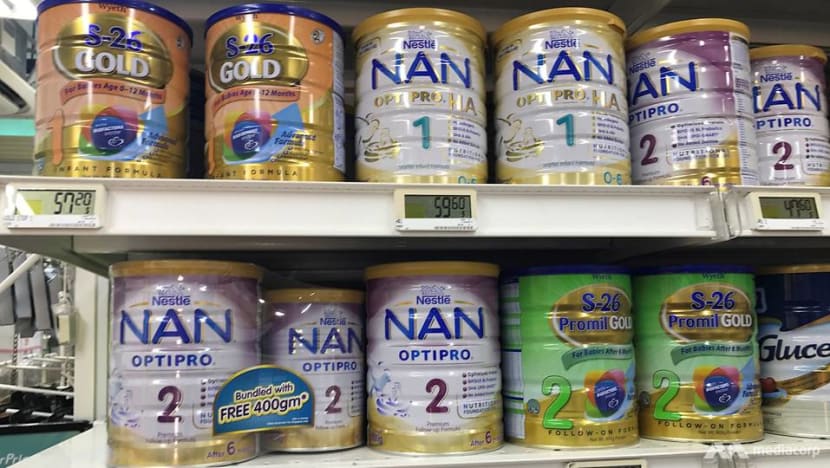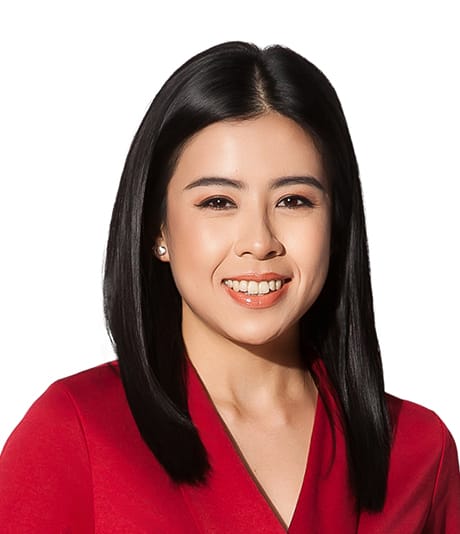Retailers call for review of infant formula import rules

Tins of baby milk powder on supermarkets shelves in Singapore. (Photo: Elizabeth Neo)
SINGAPORE: Local retailers and importers are calling for food import regulations to be reviewed to make it easier for the parallel import of baby milk powder.
This comes as the Competition Commission of Singapore (CCS) noted in a report last month that there was a ‘negligible presence’ of parallel imports in Singapore, which could be due to the formula milk product labelling and import documentation requirements.
It added this could be challenging for parallel importers in Singapore to comply with. In its recommendations to encourage price competition among infant formula brands, the CCS suggested that these requirements be reviewed.
While a 700g box of Dugro infant milk formula, obtained from authorised importers, cost S$18.90 in major department stores like FairPrice and Sheng Siong, a 900 gram version from parallel importers costs between S$12 and S$14, depending on the retailer.
But despite the price difference of some S$10 to S$12, there has not been a huge demand for parallel imported products, say retailers.
Local chain U Stars Supermarket, which started operations about two years ago, carries only one type of parallel imported milk formula with the rest imported from local dealers. Its Head of Corporate Services Cliff Heng said the company would consider bringing in more parallel imported brands, dependent on the receptivity of customers.
“I think it’s a general vibe from Singaporeans that ‘we go for quality’, so they have a misconception that when it is imported from other countries, if it’s not a good price also the quality might be different,” he noted.
Mr Heng added that the price difference for parallel imports of milk powder is primarily due to the foreign exchange rates from other countries, which is why retailers like themselves can get a better profit margin if they get more parallel imports for baby formula.
Besides a lack of demand, other challenges like stringent product labelling and import documentation requirements have made it difficult for importers.
The Agri-food and Veterinary Authority told Channel NewsAsia that “all food importers are required to ensure that the products imported meet AVA’s import and food safety requirements. Enforcement action will be taken against those who fail to comply with AVA’s requirements.”
Parallel imports are subject to the same import and food safety regulations, which means these consignments must also be accompanied by relevant documents such as health certificates, laboratory analysis reports, and a copy of the overseas manufacturer’s license, to certify that the requirements are met. “The labelling on formula milk products must also comply with our mandatory labelling requirements,” it added.
Operations Supervisor at Seng Choon Huat Trading Goh Wee Teck said parallel imports are easy to procure, but they come with several restrictions. “For example milk powder, cannot be labelled as ‘fortified’ or have any claims says it (the product) t helps to enrich the brain cells or anything like that. Also the ingredients (list) must be in English.”
But he expressed hope that this process could be made easier, with bigger players entering the market.
In response to queries from Channel NewsAsia, supermarket chain Sheng Siong said it currently does not parallel import infant milk formula but is exploring the possibility of doing so and is waiting for the relevant documentation to be processed.
Meanwhile FairPrice said it will expand its sourcing options, including turning to alternative suppliers based overseas. “Following the recent review on import restrictions by the government, we are in discussion with the authorities and will be expanding our sourcing options to provide better value products to parents including sourcing from alternative suppliers based overseas,” it said.
It added, “There are, however, issues to consider in the approach of alternative overseas sources - such as ability to supply the volume required, resilience in stock replenishment, and the assurance of product quality.”














